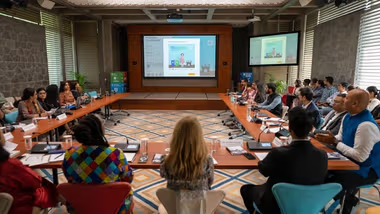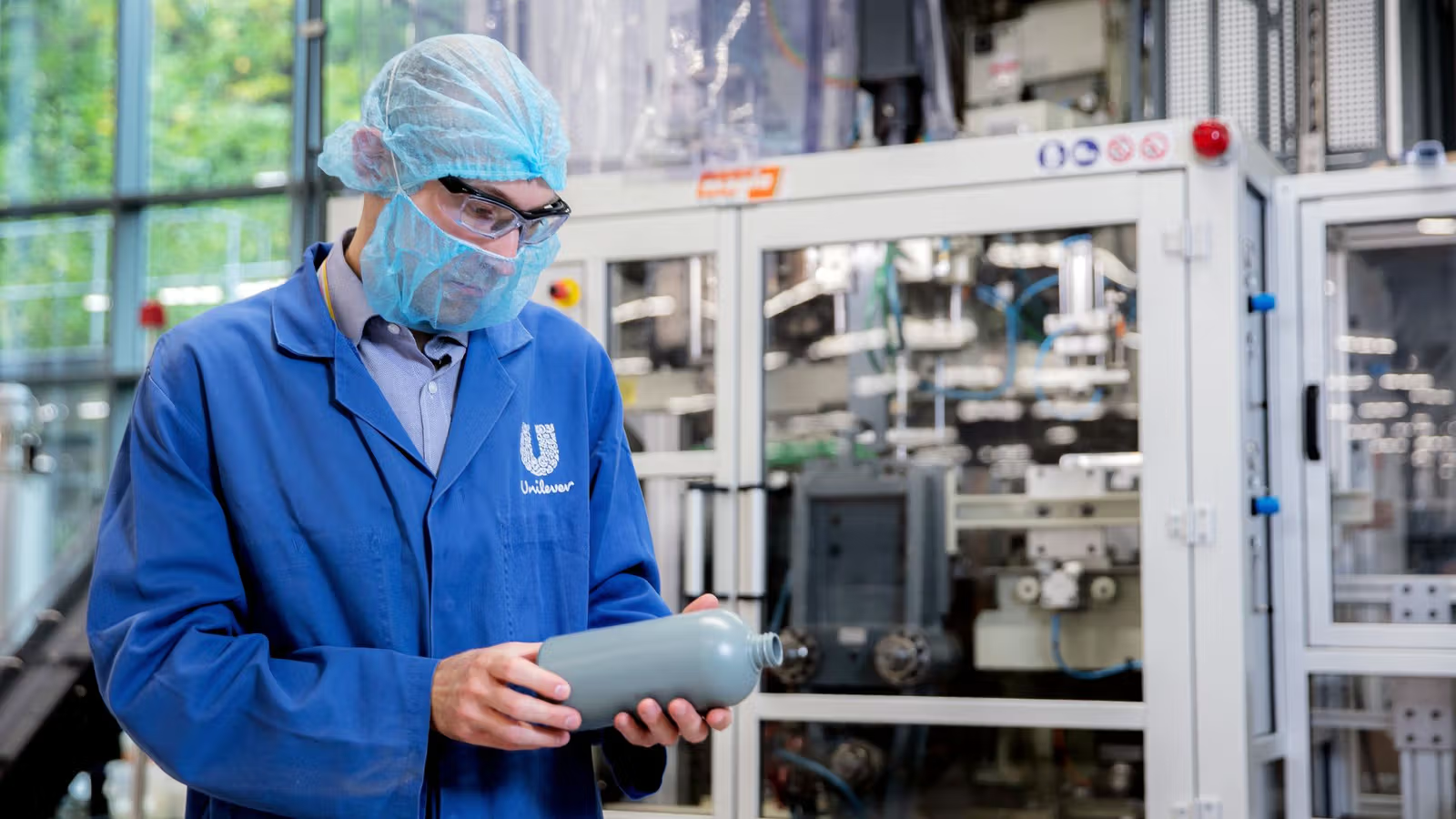
Tackling plastic waste and enabling plastic circularity
Tackling plastic waste and enabling plastic circularity
At HUL, we are continuously looking at new ways to reduce, re-use, recycle and recover packaging and waste as we move towards becoming a zero-waste business.
We are committed to accelerating a transition to a circular economy, moving from the linear take-make-dispose model to a regenerative approach, which keeps materials at their highest value for as long as possible. We work across sectors to share and extend learnings to build sustainable best practices; a recent example is our work with FICCI and Resource Efficiency Circular Economy Industry Coalition (RECEIC) packaging group to release Packaging Reimagined 2.0 Alternate and sustainable solutions.
Less, better and no plastic framework
Less plastic
Less plastic
Sometimes a complete rethink of how we design and package products is the best way to reduce plastic. We have resized sachets across our Hair and Home Care portfolio and developed a new slim cap design for our Glow & Lovely tubes to reduce the use of virgin plastic.
Better plastic
Better plastic
We have been thinking of innovative solutions to redesign our packaging by cutting down the use of virgin plastic and replacing it with post-consumer recycled (PCR) content.
For several years we have been at the forefront fostering recyclers, nurturing startups, and championing sustainable practices.
In a groundbreaking collaboration with Banyan Nation, we achieved a significant milestone by incorporating PCR into our bottles for the first time in India and since then have been expanding post-consumer recycled content (PCR) inclusion across our Brands.
As one of the early adopters, we have integrated post-consumer recycled plastic (PCR) into our packaged food products, such as the Kissan Squash bottle, following the recent r-PET regulation update.
We have pioneered using Post-Consumer Recycled (PCR) materials in our flexible packaging, such as pouches, overwraps, and shrink-wraps. In March 2025, we further strengthened our commitment to sustainability by acquiring a stake in Lucro Plastecycle Private Limited, a firm specialising in recycled flexible plastics. These collaborative efforts represent key milestones in sustainable packaging, support the growth of our supply chain partners, and drive innovation within the industry.
25 of our brands, such as Vim Dishwash, Surf excel, Comfort, Vaseline, Dove, Sunsilk, and Lifebuoy, now utilise PCR materials in packaging.
No plastic
No plastic
No plastic means rethinking how we design products, developing whole new business models, and new shopping experiences for our consumers. It also means switching out of plastic for alternative options such as metals, paper and glass.
We have developed coating technology to replace the polymer coating in our soap cartons.
Our Extended Producer Responsibility (EPR) journey
The Plastic Waste Management Rules in India have been evolving; new guidelines on Extended Producer Responsibility (EPR) came into effect from February 2022. However, at Hindustan Unilever, we have been collecting plastic waste since 2018 and started formally recording data since then. We were one of the first companies since 2021 to collect and responsibly process more plastic than we use in the packaging of our finished products and we continue to do so year on year. We are now following the new national EPR Framework notified by Central Pollution Control Board (CPCB) that has become operational since April 2023. HUL is meeting its EPR obligation in totality at a national level.
Our plastic packaging footprint (approx. in tonnes)
2018 | 2019 | 2020 | 2021 | 2022 | 2023 | 2024 |
97,000 | 96,000 | 1,06,000 | 1,07,000 | 1,18,000 | 1,22,000 | 1,25,000 |
Year on Year Plastic EPR Quantity (in tonnes)
2018 | 2019 | 2020 | 2021 | 2022 | 2023 | 2024 |
20,000 | 59,000 (cumulative) | 11,7,000 (cumulative) | 2,34,000 (cumulative) | 3,52,000 (cumulative) | 4,75,000 (cumulative) | 6,56,000 (cumulative) |
Moving to other packaging materials
We are on our way to achieving a deforestation-free supply chain by using 100% Forest Stewardship Council (FSC) certified paper and board since 2023.
While we prefer paper packaging from well-managed forests or recycled materials, safety regulations may necessitate virgin paper and board sourcing. In such cases, we procure from certified sources with a complete 'chain of custody' from the plantation to us, certified by bodies like FSC or the Global Traceability System.
Our metal packaging, primarily for deodorant cans, emphasises post-consumer and post-industrial recycled content. We source approximately 1,701 tonnes of metal for packaging. Additionally, our glass packaging for Foods and Refreshment products, amounting to nearly 11,967 tonnes, follows strict regulations.

Creating waste free communities around our operations
Through Prabhat, our community development initiative around our operations, we have been driving behaviour change and end-to-end community waste management initiatives like community biogas plants, creating awareness about waste segregation at source, promoting organic kitchen gardens that use compost in households and upcycling waste into value-added products such as benches and handwashing stations.

Accelerating circularity
Project Circular Bharat is our end-to-end model that connects three critical levers: behaviour change to inspire source segregation, social inclusion of waste workers, and integrated recycling infrastructure to establish a circular system.
Anchored in innovation and a solutions-led approach, Project Circular Bharat is powered by a robust network of partnerships, bringing together 20+ partners across 10+ Indian cities. This includes government, UNDP India, Xynteo, other corporates such as SBI Foundation, startups, and community organisations. The model is now being scaled up as a blueprint for inclusive circularity system in India.
The three levers of Project Circular Bharat:

Behaviour change to inspire source segregation (1 of 3)
Waste segregation is the first domino in the waste management chain, influencing the entire system's efficiency and environmental impact. To inspire people to segregate waste at homes, we launched ‘Start A Little Good’, a door-to-door behaviour change program that enrols college students as ambassadors of change to demonstrate how a simple act of segregation can create a big impact.
- 5,45,000 citizens inspired across Mumbai and Chhatrapati Sambhajinagar, Maharashtra.
- 200+ Student ambassadors trained through a structured internship programme.
- 30%* increase in segregation rates from baseline.
*As per an Impact Study conducted by Sattva in 2024.

Social inclusion of waste workers (2 of 3)
Despite their valuable role, waste workers continue to be at the forefront of various challenges including marginalisation and social exclusion, increased vulnerability to climate and natural disasters, low and unsteady incomes and health risks.
In partnership with the United Nations Development Programme (UNDP) we launched Project Utthaan, a first-of-its-kind programme that focuses on linking waste workers with government social protection schemes, including Pradhan Mantri Suraksha Bima Yojana, Pradhan Mantri Jeevan Jyoti Bima Yojana, E-SHRAM card, and Jan Dhan account.
- 20,000 Safai Mitras have got access to over 47,000 government social protection schemes covering food, health, identity, safety, education, and financial inclusion.
- INR 8.76 of the social value for Safai Mitras and their families was created for every INR 1 of investment on the programme.*
- 50% Safai Mitras impacted under the programme indicated better saving habits, with average annual savings of ₹2,341.
*As per the Impact assessment conducted by KPMG Assurance & Consulting Services LLP, 2025.

Integrated recycling infrastructure (3 of 3)
HUL has set up sustainable end-to-end waste management projects enabling waste collection, segregation, processing, and recycling. The projects have been set up in partnership with the Brihanmumbai Municipal Corporation (BMC), State Bank of India, Chhatrapati Sambhajinagar Municipal Corporation (CSMC), United Nations Development Programme (UNDP) and Xynteo. UNDP and Xynteo are our design, monitoring and evaluation partners.
- 7 operational Material Recovery Facilities (MRFs)
- 7,000 metric tonnes of waste processed annually in our MRFs
Awareness to action toolkit
In 2024, HUL deepened its catalytic role by launching an ‘Awareness to Action Toolkit’ with three key Central Government Ministries: Ministry of Environment, Forest & Climate Change, Ministry of Social Justice & Empowerment and Ministry of Urban & Housing Affairs. The toolkit provides actionable frameworks and tools to accelerate circularity at scale across the country.

Unilever’s Plastics targets
An end to plastic pollution through reduction, circulation and collaboration
Reduce our virgin plastic footprint – by 30% by 2026, and 40% by 2028, from a 2019 baseline
100% of our plastic packaging to be reusable, recyclable or compostable – by 2030 (for rigids) and 2035 (for flexibles)
Use 25% recycled plastic in our packaging by 2025
Collect and process more plastic packaging than we sell by 2025

Our other sustainability priorities

Climate
Climate action has long been a part of how we do business. But the world must move faster to avoid the worst effects of climate change. We've set more ambitious climate targets and identified clearer actions to respond to this challenge.

Nature
The world – and our business – needs resilient natural and agricultural ecosystems to thrive. We’re committed to contributing to the protection and regeneration of nature, within and beyond our value chain.

Livelihood
The impacts on inequality go far beyond income – to health, human rights and economic growth. So we're working to improve the livelihoods of people in our global value chain.
